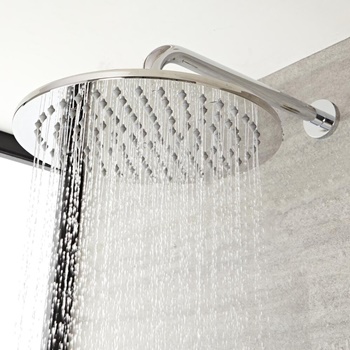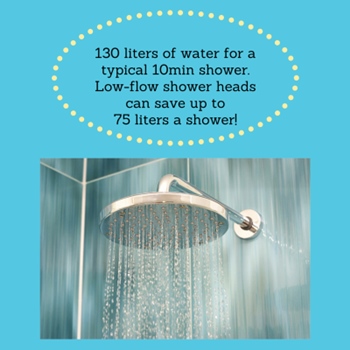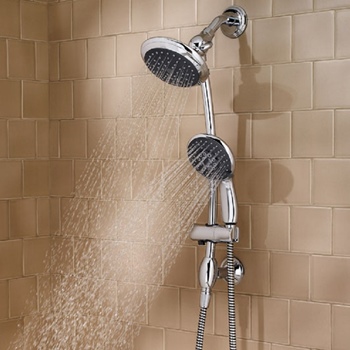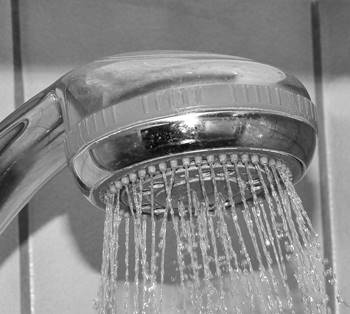As human beings in a world where we all want to be socially accepted, a mandatory aspect of that is this: for obvious reasons, we need to shower. Baths take quite a long time, which is why we always need to ensure that we have a quick place to wash up. And for that reason, we need a good shower head.
However, with all the different kinds of showerheads, it might be quite difficult to find one that is actually suitable for your bathroom. With this article, we want to make it easier for you – so that you know exactly what you should install in your bathroom. The shower place should be a small haven – which is why you need to ensure that you make the right choice.
Understanding How a Shower Head Works
 Showerheads are fairly complex in the way they work, which is why you need to understand their functions. We’ll talk fairly soon about the types of showerheads – but before that, there are several considerations that you might want to keep in mind.
Showerheads are fairly complex in the way they work, which is why you need to understand their functions. We’ll talk fairly soon about the types of showerheads – but before that, there are several considerations that you might want to keep in mind.
1. The Pressure
Many people seem to think that the showerhead is the one that determines the pressure of the water coming from the pipe. However, the pressure has nothing to do with it. In fact, your showerhead depends on the pressure that you allow for your home (there is usually a knob you turn that allows you to adjust the pressure).
Depending on the showerhead, it might need a certain PSI in order for the flow to be effective. If there’s not enough pressure in your home for the shower head that you have chosen, then there will not be enough strength in the water and not enough consistency for the shower to be effective.
Most showerheads will require around 40-60 PSI to function at their proper capacity. You may be able to raise the pressure in your house if it’s too low, but depending on the house, you might need the help of a plumber.
2. The Spray
Depending on the showerhead, it will spray the water at different speeds, intensities, and patterns. Most units will even include settings so that you can choose which one you prefer for yourself.
When searching for the right shower head for you, you might want to look at what the showerhead provides. Here are the main settings that you might find in a showerhead.
- Wide: This one is generally the default option, and you use it to spray water out of each nozzle at the same consistency and speed.
- Rinse: This setting will pour out of the nozzles in the middle, for the purpose of soaking.
- Targeted: The setting shoots water that is “harder” than normal from the shower head – but only through a few nozzles.
- Pulsating: This one sends out water from the showerhead nozzles in an alternating pattern.
Some showerheads will only have one of these features, whereas others will have multiple choices. You just need to figure out your shower needs so that you know exactly which shower head to choose.
3. Energy Consumption
 The more water a showerhead uses, the more energy it will consume. Since the average shower uses around 2.1 GPM, you can imagine that it takes quite a fair amount of energy to bring that water up the pipe and warm it up.
The more water a showerhead uses, the more energy it will consume. Since the average shower uses around 2.1 GPM, you can imagine that it takes quite a fair amount of energy to bring that water up the pipe and warm it up.
If you need to save on energy, then you might want to go for a showerhead that uses less than 2.0 GPM. In this case, less is more. It is also a great choice if you have many water appliances in your home and you tend to consume quite a lot of water.
4. Looks
Last but not least, you don’t want an ugly shower head to stay in your otherwise pretty bathroom – which is why you have to give the looks some consideration as well. The showerhead that you choose needs to have the same finish that the rest of your bathroom has.
For instance, if the rest of your bathroom has a sleek nickel color, you can’t go and purchase a metallic chrome shower head simply because it’s cheaper. You need to buy something that matches – because after all, that will be adorning your bathroom for quite a long time.
Types of Shower Heads
When it comes to picking up a good shower head, you should know that there are several types of showerheads to choose from. Depending on your home or your personal preferences, one type of showerhead might be more suitable than others. Here is what you might want to choose from:
1. Dual Shower Heads
 There are so many types of showerheads going around, that you cannot know for certain which one you should pick for your bathroom. However, who says that you only have to pick one of them? The more, the merrier.
There are so many types of showerheads going around, that you cannot know for certain which one you should pick for your bathroom. However, who says that you only have to pick one of them? The more, the merrier.
Yes, top-rated dual shower heads have features that will give you the benefit of two showerhead types in one bathroom. Do you want a fixed shower head, but you also want one that you can move around to massage your body? Or you feel like water coming from one direction is just not enough? In that case, go for a dual shower head.
Granted, these shower heads might ask for quite a significant amount of space – so, make sure that you have it. Otherwise, these showerheads are very easy to install, provided that you have all your plumbing parts ready for it.
2. Handheld Shower Heads
If you require quite a bit of flexibility when you are taking a shower, then you might want to go for our handheld showerhead reviews. As its name suggests, this item will also have a handle that will allow you to hold it in your hand and direct the water wherever you want it.
If you have kids or pets, this kind of showerhead will be very useful in showering them, as you can direct the rain of water directly above them – without you getting soaked in the process. It is also good for elders or people with disabilities, as it allows them to shower while sitting – and in the meantime, easily direct the water to where they need it.
Most of these shower heads can also be mounted on the wall, for moments when you need the comfort of a fixed shower head. Depending on the model, you may get one with a fixed holder or one with a rail. These will allow you to move the showerhead up and down until it reaches the perfect height for your preferences.
3. High-Pressure Shower Heads
Some people want to turn their shower into a spa experience. They want to relax in the shower – to feel the water caressing their skin with a massage after a long day. And for that, one will need some high-pressure shower head reviews.
With its powerful jets, such a unit will press on your skin and make you feel like you are getting a massage. For that reason, the showerhead will have to be rather powerful – so, make sure that you get one with either a higher GPM or with AirInfuse Technology.
4. Low Flow Shower Heads
 As their name suggests, the best low flow shower heads are the kind of showerheads that maximize water consumption – even though they use fewer gallons per minute compared to the standard showerhead. These showerheads are perfect for those that want to save on their water bills, energy bills, and reduce the CO2 footprint that they leave on the planet.
As their name suggests, the best low flow shower heads are the kind of showerheads that maximize water consumption – even though they use fewer gallons per minute compared to the standard showerhead. These showerheads are perfect for those that want to save on their water bills, energy bills, and reduce the CO2 footprint that they leave on the planet.
Bear in mind that low flow showerheads do exactly what their name suggests: deliver water on low flow. Even though they generally use technology to increase the water velocity and force, the resulting pressure is not as strong as one from a high-pressure showerhead, for example.
For this reason, a low flow unit might not be as good as a massager – not unless you choose something with the “highest low” water flow. If you go for a 1.25 GPM model, for example, you might not be able to get that relaxing massage benefit. However, if you go for one that has around 2.0 or 2.5 GPM, you have more chances of enjoying a very relaxing shower.
Aside from their water-saving abilities, these showerheads are also perfect when you are living in an area with less water flowing from the pipes. They will increase the force of the water, giving the impression of more pressure, allowing you to have a spa-like experience.
5. Rain Shower Heads
The best rain shower heads are among the luxurious kind and are also well-known for their ability to offer a rain-like experience. These showers generally have multiple settings so that you can configure it in whatever way you want. So, whether you like to stay in light sprinkles or downpours, you may easily choose your “rainy mood.”
Consider that in order for these showerheads to give that rainy-like experience and coverage, they will have to be rather massive. Granted, the sizes do differ from one manufacturer to another – but you’d need a quite large bathroom in order to install this kind of showerhead.
Shower Heads FAQ
1. Can a Drain Opener Damage the Finish of a Shower Head?
Many people use drain openers to unclog a shower head that was closed off by minerals – which is why many people tend to ask this question. It’s good for both clogged sinks and bathtub products.
In most cases, no, a drain opener should not be able to damage the finish – but you might still want to consult with the instructions from the manufacturer. Bear in mind that it should not be left on the shower head for more than 30 minutes.
2. My Shower Head Is Dripping! Can I Do Anything to Fix That?
If your shower head seems to be constantly dripping, then it might be a sign that there is a problem with the faucet valve. Check for the temperature of the water as it is dripping so that you might find out the source.
If the leaking water is warm, then it’s a clear sign that the leaking is coming from the hot water valve. On the other hand, if the water is cold, then it means that the problem lies in the cold water valve. Regardless of the case, this will mean that you will have to replace the faucet valve.
3. What Is a Good Way to Clean My Shower Head without Damaging It?
There are several cleaning products that you can purchase for this purpose from the supermarket. However, you might want to try a milder cleaning agent, so that you do not damage the finish. In most cases, leaving it to soak in a mix of equal quantities of water and white vinegar should be able to do the trick. Somewhere around 20 minutes should be enough for the minerals and other buildups to detach.
4. Do Shower Heads Carry Bacteria or Does the Water Clean Them?
Unless it has been equipped with antibacterial technology, there is a chance that your showerhead might carry bacteria. Most of them are not really harmful to human beings. Still, depending on the area, there is a chance that they might carry the NTM bacteria, which is quite harmful to the lungs.
If you do not have a showerhead with antibacterial properties, make sure that you give it a regular clean. This way, even if the bacteria do build up, they will not stay long enough to cause any real harm.
5. How Often Should I Clean My Shower Head?
This question does not have an exact answer, as it depends on both your shower head and the water in your home. If you have an antibacterial shower head with anti-clogging properties, you can get away with not cleaning it for weeks. However, if it has none of these, then you might want to clean it more often.
Ideally, you might want to give your showerhead a deep clean at least once every month. However, experts recommend that you do this once a week to keep your shower in peak condition – and to keep the bacteria from building up on your shower head. Make sure that you don’t use a very strong cleaning solution, so you don’t damage the finish in the long run.
6. How Long Will a Shower Head Generally Last?
This will depend on the showerhead that you purchase. A standard, ABS thermoplastic handheld shower will last for about 6 months before you have to change it. But if you purchase one made of metal or with a fixed installation, it is likely that it will last for a much longer time. The more you meddle with a plastic item, the faster it will break – and this usually applies to everything.
Wrap Up
There are various criteria to consider when it comes to picking the right shower head for you, as these units come in various shapes and sizes. What’s important is that you analyze your own needs – and based on that, you choose a type of shower head that suits your purposes the most.
Hopefully, we have managed to bring you the information that you needed regarding showerheads. Everyone should have their own little piece of heaven – and in most cases, we find it in the bathroom, under the jet of our shower head.